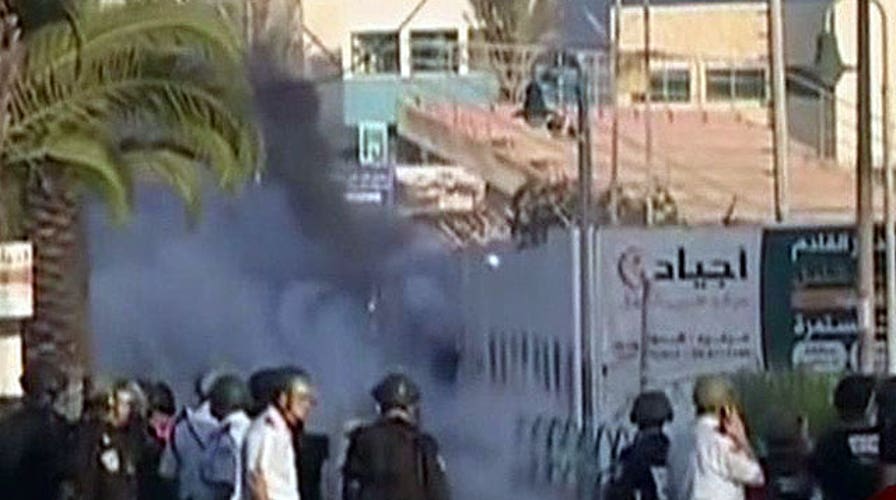Hamas vows revenge after 7 militants killed in airstrikes
John Huddy reports from Israel/Gaza border
Israel doesn’t celebrate the Fourth of July, but during the weekend the skies over the southern border with Gaza were filled with the rockets’ red glare and bombs bursting in air, giving proof through the night that Hamas was still there.
There were fireworks in the cities, too, brought about by a confluence of events early in the month. It was Ramadan, the month-long Muslim festival of daytime fasting that puts everyone on edge, especially during a brutal heatwave. On July 1, the bodies of three Jewish teenagers, kidnapped and brutally murdered, allegedly by Hamas terrorists, were laid to rest in a nationally televised funeral after a weekslong search that obsessed the country. In Jerusalem, demonstrators rioted and called for Arab blood.
[pullquote]
On July 4, 25 mortars and missiles were shot at Israel. Three were downed by Iron Dome, the anti-rocket system batteries installed on the Gaza border. The others fell into open spaces or uncultivated fields. No one was killed or physically injured, but every launch set off a nerve-racking siren and a scramble for cover, and produced victims of shock.
These attacks have been going on for weeks, and there is a Kabuki aspect to them. The Palestinians have fired hundreds of missiles, but managed to kill nobody. Still, they inspire rage and fear in the border towns, whose people feel like ducks in a shooting gallery of inept but determined hunters. After the barrage on July 4, local leaders loudly began demanding action, something more than the half-hearted Israeli air force reprisals whose evident purpose, mostly successful, had been to avoid causing casualties.
In the absence of bloodshed, there had been bombast, exacerbated by the kidnapping of the three teenagers. Hamas leaders, their faces hidden by scarves for full scary effect, threated to bomb metropolitan Tel Aviv, where it is harder to miss hitting civilians, and Jerusalem, whose Muslim holy sites have put the city off limits to Arab missile attacks in the past. Not even Saddam Hussein, in the first Gulf War, wanted to go down in history as the idiot who leveled the Mosque of Omar with an errant SCUD.
On the Israeli side, several senior Cabinet ministers vied for popularity by calling for drastic action, including a full scale invasion and occupation of Gaza. Prime Minister Benjamin Netanyahu leads a team of rivals and future electoral opponents who see political profit in selling fantasy scenarios to a distraught public.
In the past, Netanyahu himself hadn’t been above this kind of demagoguery, but he was doing his best to tamp down emotions and stay out of the briar patch that awaits Israel in Gaza.
On July 2, a gang of Israelis, taking the chants of “death to the Arabs” literally, allegedly abducted a 16-year-old Palestinian schoolboy, Muhammad Abu Khdeir, near his home in East Jerusalem, beat him senseless, set him on fire and left him to die in a deserted forest.
When the corpse was found the next day, Palestinians in Jerusalem took to the streets, throwing rocks and firebombs at riot police. The footage reminded Israelis of the Second Intifada, a bloody terror war that immiserated the entire country during the first five years of the new millennium.
Even more disconcertingly, the Arab citizens of Israel staged their own violent demonstrations, blocking major roads, pelting Jewish drivers with rocks and clashing with the cops. For years, Arab citizens had been the targets of “price tag” harassment by ultra-nationalist Jewish teenagers from which the government failed to protect them. This was an opportunity to express their justifiable frustration and anger.
On the Fourth of July, Netanyahu attended the U.S. Embassy’s annual bash, but he had nothing to celebrate. Gaza was under fire. The cities were burning. Things appeared to be spinning out of control. He faced accusations by the Palestinians that he wouldn’t even try to catch Abu Khdeir’s murderers.
Two days later, Netanyahu caught a break. The police arrested six men allegedly implicated in the boy’s murder. Bibi used the occasion to regain his favorite real estate, the moral high ground.
“We do not distinguish between acts of terrorism and we will act against both [Jewish and Palestinian terrorists],” he told Israeli reporters.
Israeli words, no matter how fair-minded, will not be enough. To avoid escalating fireworks, the Netanyahu government will have to demonstrate that it is really fighting Jewish terrorism.
As for Gaza, the Kabuki war can’t last much longer. The politics of the situation won’t permit it.
If Hamas stops firing, Israel will too. If not, the people of Gaza won’t have to wait until next Fourth of July for the rockets’ red glare.

